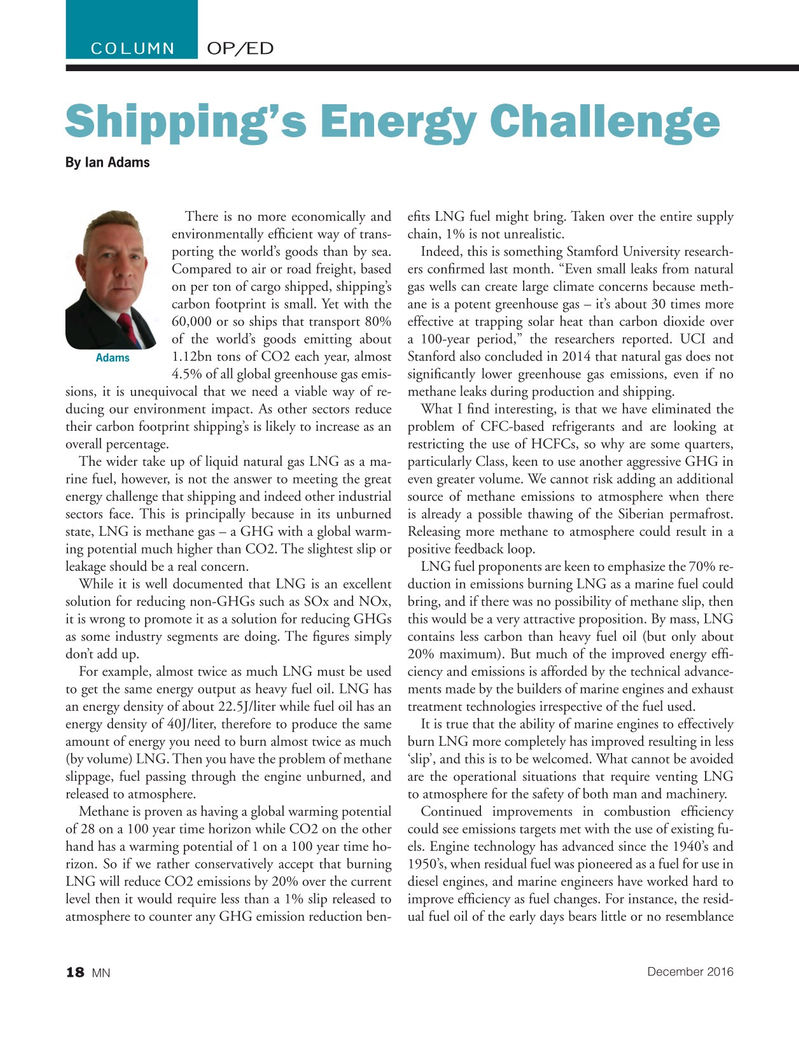
Page 18: of Marine News Magazine (December 2016)
Innovative Boats of 2016
Read this page in Pdf, Flash or Html5 edition of December 2016 Marine News Magazine
COLUMN OP/ED
Shipping’s Energy Challenge
By Ian Adams
There is no more economically and e? ts LNG fuel might bring. Taken over the entire supply environmentally ef? cient way of trans- chain, 1% is not unrealistic. porting the world’s goods than by sea. Indeed, this is something Stamford University research-
Compared to air or road freight, based ers con? rmed last month. “Even small leaks from natural on per ton of cargo shipped, shipping’s gas wells can create large climate concerns because meth- carbon footprint is small. Yet with the ane is a potent greenhouse gas – it’s about 30 times more 60,000 or so ships that transport 80% effective at trapping solar heat than carbon dioxide over of the world’s goods emitting about a 100-year period,” the researchers reported. UCI and 1.12bn tons of CO2 each year, almost Stanford also concluded in 2014 that natural gas does not
Adams 4.5% of all global greenhouse gas emis- signi? cantly lower greenhouse gas emissions, even if no sions, it is unequivocal that we need a viable way of re- methane leaks during production and shipping. ducing our environment impact. As other sectors reduce What I ? nd interesting, is that we have eliminated the their carbon footprint shipping’s is likely to increase as an problem of CFC-based refrigerants and are looking at overall percentage. restricting the use of HCFCs, so why are some quarters,
The wider take up of liquid natural gas LNG as a ma- particularly Class, keen to use another aggressive GHG in rine fuel, however, is not the answer to meeting the great even greater volume. We cannot risk adding an additional energy challenge that shipping and indeed other industrial source of methane emissions to atmosphere when there sectors face. This is principally because in its unburned is already a possible thawing of the Siberian permafrost. state, LNG is methane gas – a GHG with a global warm- Releasing more methane to atmosphere could result in a ing potential much higher than CO2. The slightest slip or positive feedback loop.
leakage should be a real concern. LNG fuel proponents are keen to emphasize the 70% re-
While it is well documented that LNG is an excellent duction in emissions burning LNG as a marine fuel could solution for reducing non-GHGs such as SOx and NOx, bring, and if there was no possibility of methane slip, then it is wrong to promote it as a solution for reducing GHGs this would be a very attractive proposition. By mass, LNG as some industry segments are doing. The ? gures simply contains less carbon than heavy fuel oil (but only about don’t add up. 20% maximum). But much of the improved energy ef? -
For example, almost twice as much LNG must be used ciency and emissions is afforded by the technical advance- to get the same energy output as heavy fuel oil. LNG has ments made by the builders of marine engines and exhaust an energy density of about 22.5J/liter while fuel oil has an treatment technologies irrespective of the fuel used. energy density of 40J/liter, therefore to produce the same It is true that the ability of marine engines to effectively amount of energy you need to burn almost twice as much burn LNG more completely has improved resulting in less (by volume) LNG. Then you have the problem of methane ‘slip’, and this is to be welcomed. What cannot be avoided slippage, fuel passing through the engine unburned, and are the operational situations that require venting LNG released to atmosphere. to atmosphere for the safety of both man and machinery.
Methane is proven as having a global warming potential Continued improvements in combustion ef? ciency of 28 on a 100 year time horizon while CO2 on the other could see emissions targets met with the use of existing fu- hand has a warming potential of 1 on a 100 year time ho- els. Engine technology has advanced since the 1940’s and rizon. So if we rather conservatively accept that burning 1950’s, when residual fuel was pioneered as a fuel for use in
LNG will reduce CO2 emissions by 20% over the current diesel engines, and marine engineers have worked hard to level then it would require less than a 1% slip released to improve ef? ciency as fuel changes. For instance, the resid- atmosphere to counter any GHG emission reduction ben- ual fuel oil of the early days bears little or no resemblance
December 2016 18
MN
MN Dec16 Layout 18-31.indd 18 MN Dec16 Layout 18-31.indd 18 11/21/2016 11:12:11 AM11/21/2016 11:12:11 AM

 17
17

 19
19
